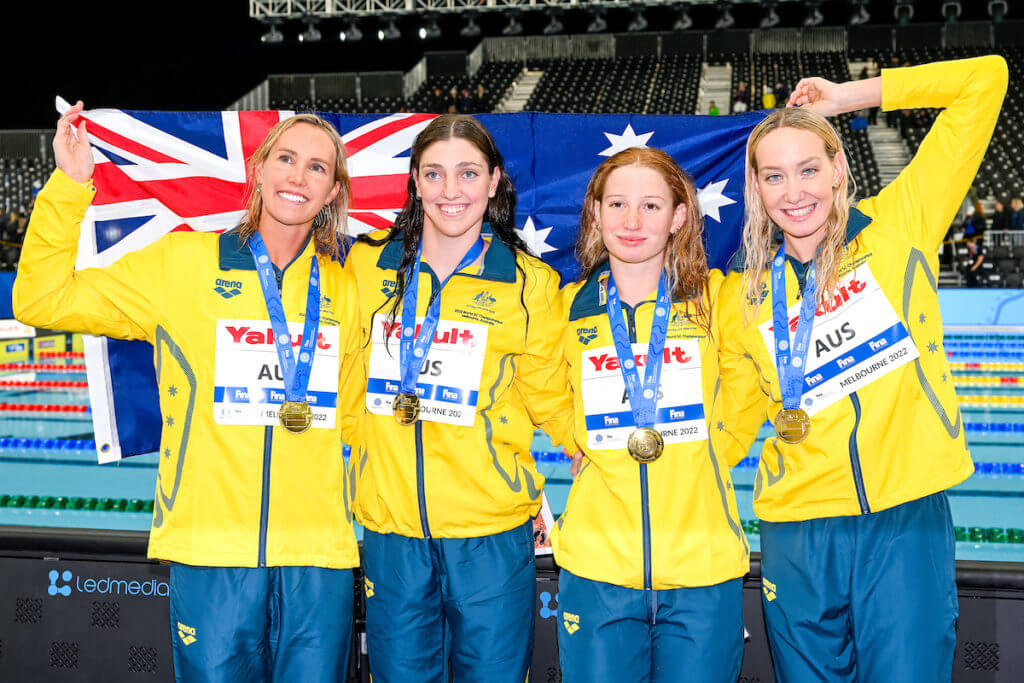World Championships Preview — Women’s Relays: Head-to-Head Battles Between Australia and United States (Predictions)

Editorial content for the 2023 World Aquatics Championships is sponsored by FINIS, a longtime partner of Swimming World and leading innovator of suits, goggles and equipment.

World Championships Preview — Women’s Relays: Head-to-Head Battles Between Australia and United States (Predictions)
Dating back to the 2012 Olympics in London, Australia and the United States have claimed 22 out of 24 women’s relay gold medals on offer at the World Championships and Olympics. The lone exceptions were Chinese wins at the 2015 Worlds (400 medley relay) and 2021 Olympics (800 freestyle relay). The two powerhouse countries each bring star power and depth to every major competition, and the Fukuoka World Championships will be no different. In fact, it would be a surprise if the U.S. and Australia did not finish 1-2 in some order in all women’s relays.
The only country normally capable of breaking up that stranglehold is Canada, but Penny Oleksiak will miss Worlds after anchoring all three Canadian relays to medals last year. Let’s break down how the two nations and any possible challengers stack up.
Previous Events:
- Men’s Mid-Distance Freestyle
- Women’s Mid-Distance Freestyle
- Men’s Individual Medley
- Women’s Individual Medley
- Men’s Breaststroke
- Women’s Butterfly
- Men’s Backstroke
- Women’s Distance Freestyle
- Mixed Relays
- Women’s Backstroke
- Men’s Distance Freestyle
- Women’s Breaststroke
- Men’s Butterfly
- Women’s Sprint Freestyle
- Men’s Sprint Freestyle
- World Aquatics Meet Homepage
| Women’s 400 Freestyle Relay | |||||
| WR | 3:29.69 | Australia (B. Campbell, M. Harris, E. McKeon, C. Campbell) | Tokyo (JPN) | July 25, 2021 | |
| CR | 3:30.21 | Australia (B. Campbell, B. Throssell, E. McKeon, C. Campbell) | Gwangju (KOR) | July 21, 2019 | |
Australia owns a winning streak in the 400 freestyle relay dating back to 2018, and the only two Aussie losses (both to the Americans, of course) within the last decade have been by tiny margins. This year, the Americans will send their deepest contingent to date to the World Championships, with Kate Douglass and Abbey Weitzeil having broken 53 in the 100 free at U.S. Nationals while Gretchen Walsh and Olivia Smoliga each swam 53-low best times. Torri Huske returns as a relay candidate after winning 100 free bronze at last year’s World Championships.
But the group of Aussie challengers is simply daunting, with Mollie O’Callaghan, Emma McKeon and Shayna Jack ranked first, third and fifth, respectively in the world, all at 52.6 or better. Meg Harris has a season-best mark of 53.09 while veteran Madison Wilson provides depth. If each woman swims around their respective 2023 best times with solid relay exchanges, the world record from the Tokyo Olympics, in a race featuring veterans Cate Campbell and Bronte Campbell, could come under threat.
A comparison of the top composite Australian and American relays using only 2023 times puts Australia about one second ahead.
Australia: Molly O’Callaghan 52.48 + Emma McKeon 52.52 + Shayna Jack 52.64 + Meg Harris 53.09 = 3:30.73
United States: Kate Douglass 52.92 + Abbey Weitzeil 52.92 + Gretchen Walsh 53.14 + Olivia Smoliga 53.28 = 3:31.91
Meanwhile, Canada, China and Great Britain should all be in the hunt for medals. Even without Oleksiak and with Kayla Sanchez off to swim for the Philippines, Canada can rely on Maggie Mac Neil, Taylor Ruck, with Rebecca Smith, Katerine Savard and star teenager Summer McIntosh as possibilities to join the group. China has three swimmers under 54 so far this year between Cheng Yujie, Yang Junxuan and Zhang Yufei while Great Britain is led by the duo of Freya Anderson and Anna Hopkin.
Prediction:
Gold: Australia
Silver: United States
Bronze: Canada
| Women’s 800 Freestyle Relay | |||||
| WR | 7:39.29 | Australia (M. Wilson, K. Melverton, M. O’Callaghan, A. Titmus) | Birmingham (GBR) | July 31, 2022 | |
| CR | 7:41.45 | United States (C. Weinstein, L. Smith, K. Ledecky, B. Sims) | Budapest (HUN) | June 22, 2022 | |
Australia has entered two consecutive major meets as the big favorite in this event, only for China and the U.S. to finish ahead at the Tokyo Games before a dominant back half helped the Americans to a world title last year. But Australia then put up a world record in the event at the Commonwealth Games, and starting with two of the top-three 200 freestylers in the world, O’Callaghan and Olympic champion Ariarne Titmus, puts the team in great shape. Additionally, Jack has shown some 200 free speed this year with a top time of 1:55.37, and at Australian Trials, Lani Pallister, Madison Wilson, Kiah Melverton and Brianna Throssell all swam under 1:57.
The Aussies have seven swimmers at 1:56 or better this year while the United States sends six: Claire Weinstein edged out Katie Ledecky for the 200 free win at U.S. Nationals with Bella Sims and Erin Gemmell rounding out the likely relay. Alex Shackell, Leah Smith and Anna Peplowski are possible alternates. Ledecky always shows up on this relay (she has split 1:53 numerous times in the past, including on last year’s title-winning squad), while Weinstein (1:55.26) and Sims (1:56.08) both swam huge best times at Nationals. Gemmell is a new member of the group with multiple 1:56-low swims over the past year, and both she and Sims have a history of 1:54 splits.
Will that be enough to make the Americans the favorites? According to the composite relay analysis, definitely not.
Australia: Mollie O’Callaghan 1:53.83 + Ariarne Titmus 1:54.14 + Shayna Jack 1:55.37 + Lani Pallister 1:56.03 = 7:39.37
United States: Katie Ledecky 1:54.96 + Claire Weinstein 1:55.26 + Bella Sims 1:56.08 + Erin Gemmell 1:56.23 = 7:42.53
China could be a factor here if Yang can approach her world-title-winning form from last year to join Li Bingjie and Liu Yaxin, and Canada will get a huge boost from McIntosh on the front end, but putting together four strong legs could be a challenge.
We will predict Australia to claim the world title but without much confidence. Last year, the Americans departed their selection meet with only one 200 freestyler (Ledecky) under 1:57 and still managed to earn a world title. This year’s far superior squad, with three improvement-minded teenagers joining Ledecky, will be dangerous.
Prediction:
Gold: Australia
Silver: United States
Bronze: China
| Women’s 400 Medley Relay | |||||
| WR | 3:50.40 | United States (R. Smith, L. King, K. Dahlia, S. Manuel) | Gwangju (KOR) | July 28, 2019 | |
| CR | 3:50.40 | United States (R. Smith, L. King, K. Dahlia, S. Manuel) | Gwangju (KOR) | July 28, 2019 | |
Almost every time, the key to a successful international medley relay is the breaststroke leg. A team with a superstar breaststroker has a huge advantage, as has been obvious in every men’s or mixed medley relay when Adam Peaty has jumped Great Britain from the back of the field after backstroke into the lead after breaststroke. On the women’s side, the Americans won Olympic gold in 2016 and then back-to-back world titles largely on the strength of Lilly King’s breaststroke, but in Tokyo, Australia’s Chelsea Hodges split within a half-second of American Lydia Jacoby on breaststroke, keeping Australia close enough to pull off the win on the end.
Now, the gap has opened back up in favor of the U.S., and that should be decisive here. Australia would normally have two solid breaststroke options in Hodges and Jenna Strauch, but both are out of the World Championships with injuries. Meanwhile, King and Jacoby both shined at U.S. Nationals, and the Americans will be favored for a 1-2 finish in the individual 100 breaststroke.
Yes, the Australians still have an advantage on freestyle, likely with O’Callaghan on the end, but if the American swimmers can simply split close to their Aussie counterparts on the three non-breaststroke legs, the breaststroke leg will be decisive. And a pair of reigning world champions, Regan Smith (100 back) and Torri Huske (100 fly), are the likely candidates to handle their respective strokes. The current composite analysis has the Americans winning by 2.71 seconds.
United States: Regan Smith 57.71 + Lilly King 1:04.75 + Torri Huske 56.18 + Kate Douglass 52.57 = 3:51.21
Australia: Kaylee McKeown 57.50 + Abbey Harkin 1:07.20 + Emma McKeon 56.74 + Mollie O’Callaghan 52.48 = 3:53.92
Canada is also weak on the breaststroke leg, but that group will have a good medal chance if Kylie Masse or Ingrid Wilm can come through on the backstroke before Mac Neil swims fly and McIntosh anchors. China has a strong back half with Zhang and Yang but question marks on the front end while Sweden could medal if a solid backstroke leg proceeds sisters Sophie and Louise Hannson and then Sarah Sjostrom on the anchor leg. Perhaps Tes Schouten’s breaststroke improvement plus Marrit Steenbergen anchoring could put the Netherlands into the mix.
Prediction:
Gold: United States
Silver: Australia
Bronze: Canada


- MEET HOMEPAGE
- COMPETITION SCHEDULE
- ENTRY LISTS
- 2022 WORLD CHAMPIONSHIPS
- LIVE RESULTS
- DAY 1 PRELIMS RESULTS
- DAY 1 FINALS RESULTS
- DAY 2 PRELIMS RESULTS
- DAY 2 FINALS RESULTS
- DAY 3 PRELIMS RESULTS
- DAY 3 FINALS RESULTS
- DAY 4 PRELIMS RESULTS
- DAY 4 FINALS RESULTS
- DAY 5 PRELIMS RESULTS
- DAY 5 FINALS RESULTS
- DAY 6 PRELIMS RESULTS
- DAY 6 FINALS RESULTS
- DAY 7 PRELIMS RESULTS
- DAY 7 FINALS RESULTS
- DAY 8 PRELIMS RESULTS
- DAY 8 FINALS RESULTS



